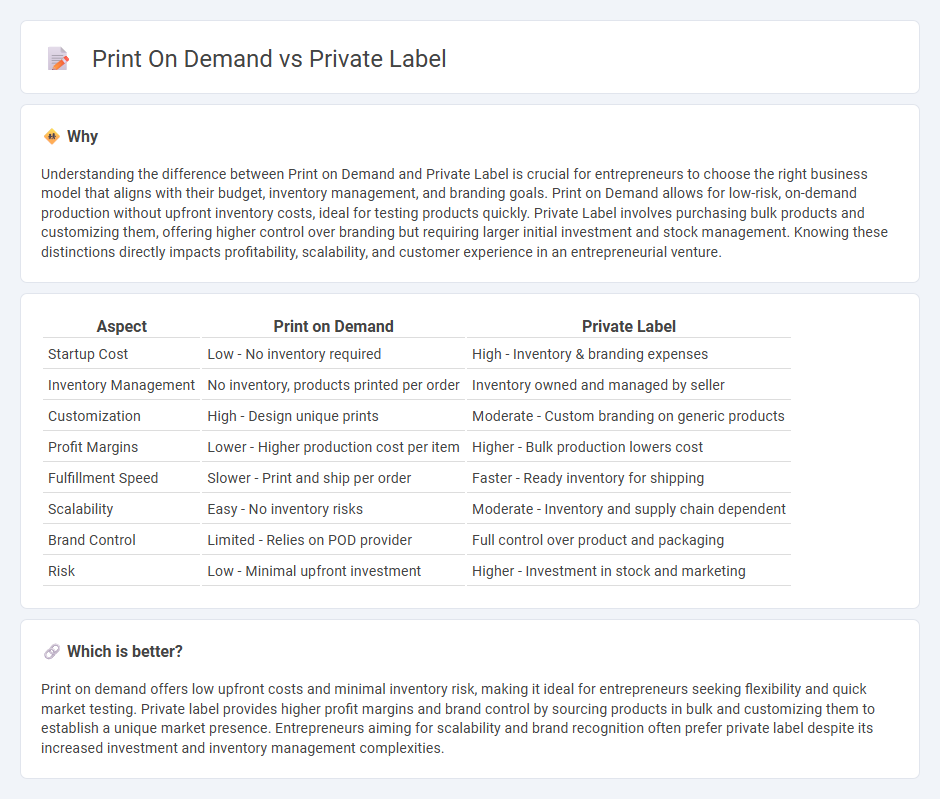
Print on demand offers entrepreneurs low upfront costs and flexibility by producing products only after a customer places an order, minimizing inventory risks. Private label requires higher initial investment but allows full control over branding and product customization, potentially yielding greater profit margins. Explore the advantages and challenges of each model to determine the best fit for your entrepreneurial goals.
Why it is important
Understanding the difference between Print on Demand and Private Label is crucial for entrepreneurs to choose the right business model that aligns with their budget, inventory management, and branding goals. Print on Demand allows for low-risk, on-demand production without upfront inventory costs, ideal for testing products quickly. Private Label involves purchasing bulk products and customizing them, offering higher control over branding but requiring larger initial investment and stock management. Knowing these distinctions directly impacts profitability, scalability, and customer experience in an entrepreneurial venture.
Comparison Table
| Aspect | Print on Demand | Private Label |
|---|---|---|
| Startup Cost | Low - No inventory required | High - Inventory & branding expenses |
| Inventory Management | No inventory, products printed per order | Inventory owned and managed by seller |
| Customization | High - Design unique prints | Moderate - Custom branding on generic products |
| Profit Margins | Lower - Higher production cost per item | Higher - Bulk production lowers cost |
| Fulfillment Speed | Slower - Print and ship per order | Faster - Ready inventory for shipping |
| Scalability | Easy - No inventory risks | Moderate - Inventory and supply chain dependent |
| Brand Control | Limited - Relies on POD provider | Full control over product and packaging |
| Risk | Low - Minimal upfront investment | Higher - Investment in stock and marketing |
Which is better?
Print on demand offers low upfront costs and minimal inventory risk, making it ideal for entrepreneurs seeking flexibility and quick market testing. Private label provides higher profit margins and brand control by sourcing products in bulk and customizing them to establish a unique market presence. Entrepreneurs aiming for scalability and brand recognition often prefer private label despite its increased investment and inventory management complexities.
Connection
Print on demand and private label connect through customizable product creation that enables entrepreneurs to launch unique branded merchandise with minimal upfront inventory risk. This model leverages print-on-demand technology to produce items only after a customer order, aligning perfectly with private labeling strategies to build distinct brand identities. Entrepreneurs optimize cash flow and market testing by combining these approaches, accelerating growth in e-commerce ventures.
Key Terms
Branding
Private label allows businesses to fully control product design, packaging, and brand identity, creating a unique market presence that builds customer loyalty and trust. Print on demand offers flexibility with minimal upfront investment but limits branding opportunities due to standardized products and packaging. Explore the advantages of each model to determine the best strategy for maximizing your brand's potential.
Inventory Management
Private Label requires upfront inventory investment, demanding accurate demand forecasting and storage management to avoid overstock or stockouts. Print on Demand eliminates inventory risks by producing items only after purchase, enabling flexible, low-risk order fulfillment. Explore detailed strategies to optimize inventory management for both models.
Customization
Private label products offer extensive customization options, allowing businesses to design unique packaging, branding, and product features tailored to specific target markets. Print on demand services focus primarily on customizable printed designs on standard products, with limited control over packaging or product variations. Explore the differences further to decide which model best suits your customization needs and business goals.
Source and External Links
Private label - Wikipedia - A private label or private-brand is a brand owned by a company and sold exclusively by them, often created by outsourcing production to a manufacturer but sold under the retailer's own brand name, commonly seen in store brands like Kroger's Simple Truth or Walmart's Great Value.
What Is a Private Label? How Private Labels Work in 2025 - Shopify - Private labeling is a business model where a product is manufactured by a third party according to the retailer's specifications and then branded and sold under the retailer's name, enabling retailers to offer exclusive products and compete effectively with national brands.
40+ Private-Label Products To Sell in 2025 - Shopify - Private-label products are produced by third-party manufacturers and sold under a retailer's brand, a growing market with strong sales, where business success hinges on brand identity, reliable manufacturing relationships, and serving niche markets like clothing, cosmetics, or groceries.
 dowidth.com
dowidth.com